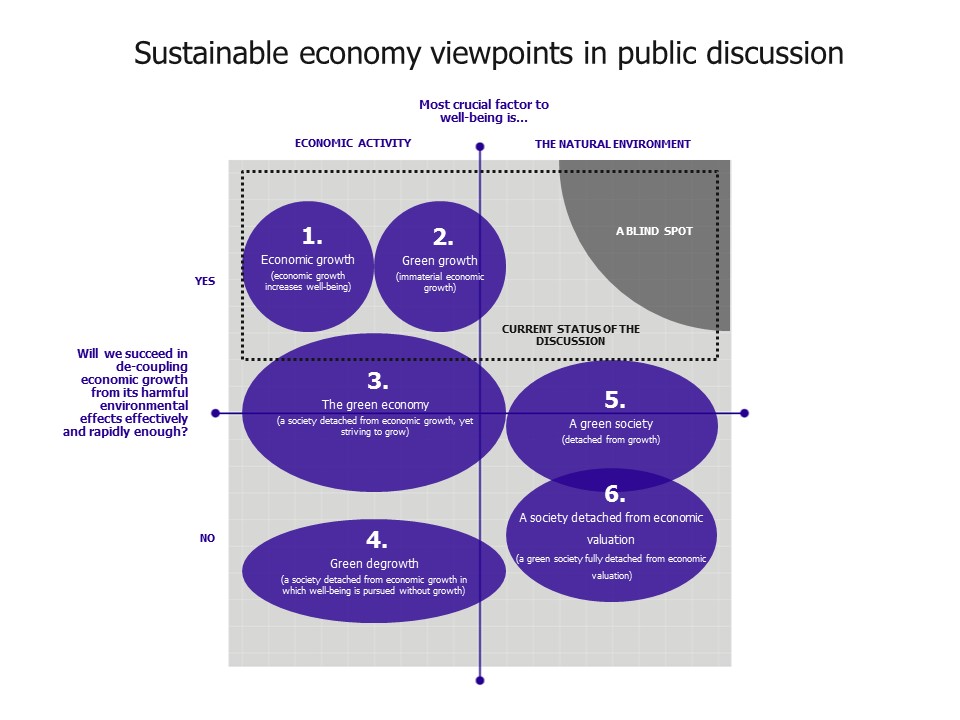Sustainable economy: one concept, six different viewpoints, unlimited opportunities to up the level of discussion.
Can well-being be created on the basis of an economy that is not sustainable? Of course it cannot. The economy must not be built on shaky ground. This is a simple fact. How could there ever be disagreement on this? Easily. As long as there are different views of what sustainability is, there will be more than one way of looking at the sustainable economy.
The current unsustainable development is likely to continue so long as the parties to the discussion keep talking past each other. Based on various grounds, opinions about what “sustainability” is will vary. Unless this is understood, the current prerequisites for building a sustainable economy will not be enhanced in the future.
What is muddying the economic discussion?
The views of the people participating in the discussion differ in particular on the following question: which factor is more crucial to human well-being: economic activity or natural resources?
We can justifiably define natural resources as the most crucial source of human well-being because it is practically impossible for us to sustain life without access to the diverse resources provided by nature.
On the other hand, there are also grounds for economic activity being more crucial, because natural resources do not provide well-being benefits to humans unless there is economic activity through which the resources are used to build well-being for humans.
Another controversial issue is de-coupling between economic growth and harmful environmental effects: what is the probability of being able to disconnect global economic growth from global harmful environmental effects effectively and rapidly enough so as to avoid the environmental disasters posing the greatest threats to the well-being of humans?
Optimists v. pessimists
The optimistic viewpoint is that human technological creativity has no limits and that we can triumph over all the key environmental challenges we will be facing in the next 20 to 100 years without having to compromise on economic growth.
The pessimistic viewpoint is that, regardless of human creativity, de-coupling cannot be executed effectively and rapidly enough to enable avoiding environmental disasters merely by developing and using technologies, and therefore compromises related to economic growth will be necessary.
The middle ground between overly optimistic and thoroughly pessimistic views is full of opinions that could be described as rational optimism (“thus far, challenges have not prevented us from making developments, so there is no need to be worried now”) or realistic pessimism (“hope for better but expect the worst – a pessimist is never disappointed”).
Where these issues intersect, we can identify at least six different ways of participating in the discussion on sustainable economy (see the graphic).

Sustainable economy viewpoints in public discussion
Illustrations of the viewpoints
Six different viewpoints, and a tremendous number of opportunities to up the level of discussion by tearing down the obstacles to mutual understanding. One has a firm opinion. Another relates to more than one viewpoint. Someone else has not yet found their voice in the discussion.
How do the representatives of the six different views take part in the discussion on sustainable economy? How would they describe the foundations of the sustainable economy? Here are some examples that can illustrate the debate:
Economic growth is the foundation of well-being (1) “Economic growth increases well-being. The resources provided by the natural environment are limited but in practice, through technological development, those limits will not hinder economic growth. For example, advantage can be taken of technology in the mitigation of climate change, and there will be enough solar energy to meet practically all our needs. The well-being of the natural environment must be respected. However, this is a task for environmental policy rather than economic policy.”
Green, or immaterial, economic growth should be a policy goal (2) “Many of the limits of the natural environment are about to be exceeded. The key challenges include climate change and the deterioration in biological diversity. These challenges must be resolved quickly. The technology necessary for de-coupling is already here, or soon will be, and therefore environmental problems will not stand in the way of economic growth. Green, or immaterial, economic growth must be set as an economic policy goal. Co-ordination between economic policy and environmental policy will be required in order to achieve this.”
Green economy detached from economic growth (3) “The limits of the natural environment have been reached. Environmental policies must be put into practice in order to ensure the avoidance of global environmental problems swiftly and effectively. By taking advantage of technology, economic growth can be made greener. In an optimistic scenario, global green economic growth becomes a reality. This should be the goal. There is also a more pessimistic scenario: as the result of strict environmental standards, economic growth could slow down, stop or even turn into degrowth in the coming decades. Green growth should be pursued but, at the same time, to be on the safe side, the economic system’s dependence on growth should be reduced.”
Green, socially sustainable degrowth (4) “Economic activities must be green. It is highly probable that detaching economic growth from harmful environmental effects cannot be done as effectively as necessary within the required time limit. In all probability, making the economy greener will, therefore, bring economic growth to a halt and possibly lead to decades of degrowth. Degrowth is not an objective; it is the outcome of strict environmental standards. For this reason, the emphasis must be on building a type of economic system that can also maintain its socially sustainable functionality during the periods of degrowth, eliminating the need to strive for economic growth.”
A green society detached from growth (5) “Environmental and societal policies are prioritised over economic policy. The economy is merely a tool. Green societal policy is necessary in building natural and human well-being. The benefits of economic growth are recognised and the green economy is valued, but the economy is very clearly viewed as a tool. Preparations are made for the pessimistic scenario that the detachment of harmful environmental effects from economic growth fails, resulting in stagnation or degrowth. The focus is, therefore, on building a green society in which well-being can be sustained without economic growth.”
A green society detached from economic valuation (6) “The relationship between humans and nature is unhealthy and it is unlikely that it can be revived in a society based on economic-centric ideologies. In an economic-centric thinking pattern, too much emphasis is put on measuring the economic efficiency of activities, thus restricting societal creativity. Being economically efficient does not, however, mean the same as being environmentally or humanly healthy. The goal should be set at achieving human well-being that respects the natural environment, in the most holistic and diverse form possible. The domination of economic policy should be actively demolished in order to make more room for discussion of societal values and for policies in which life is the crucial factor.”
—
The framework of thinking presented above was tested at Sitra’s leadership course on sustainable financial policy. Each viewpoint was supported by someone. Some participants’ perspectives widened – “it never occurred to me that green growth and the green economy could be different things”. The far ends of the spectrum, idealism and realism, went head to head inside a single person – “ideologically, I want a society detached from economic valuation, but green growth is the only realistic option”.
Learning about different viewpoints could help us escape from the blind rat race that global society is now in.
What is your opinion about the sustainable economy? What grounds do you use to justify your opinion? Are you able to see on which grounds the other viewpoints are based?


Recommended